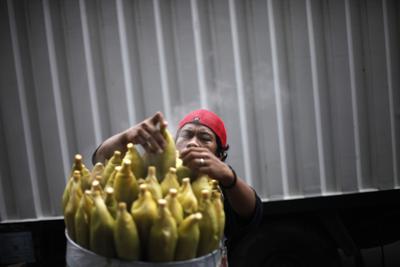But only the local government at present seems content: some unions have claimed they are not well represented in the tripartite forum, while employers’ associations and individual businesspeople have also complained, questioning the way in which the forum was established and how the selection of representatives took place.
This is significant because wages in Indonesia are not determined by the operation of the market. Indonesia’s labour market equilibrium, especially at the regional level, is generally not the result of demand-supply interaction within the traditional economic sense. Instead, it is often the consequence of disputes between labour unions and employers, with a small mediation role played by local governments.
Advocates of a higher minimum wage, particularly those on the workers side, in Indonesia seem to be fighting the wrong fight. They often argue that the welfare of workers, especially those on low incomes, could be improved by focusing less on the interests of employers, and that a higher minimum wage would boost demand and reduce worker turnover.
However, using poverty as a reason to raise the minimum wage ignores the fact that a majority of working-age individuals who live in poverty are not in paid employment, and thus cannot benefit from an increase in the minimum wage. It is also clear that a majority of those who do earn the minimum wage live in households that are not in poverty. Finally, less-skilled and less-experienced workers lose employment opportunities when the cost to hire and train them rises as a result of a minimum-wage increase. These observations are supported by a body of research stating that, on the whole, a minimum-wage increase is a poor way to help the poor — in fact, it hurts them.
A more robust argument for raising the minimum wage is that it helps workers reeling from the effects of higher inflation. By raising the minimum wage in line with inflation, a worker’s buying power will be maintained. The question still remains though of whether the minimum-wage increase requested by Indonesian labour unions tracks the country’s inflation rate.
The latest official report from West Java’s statistics bureau shows that the composite inflation rate (year-on-year) of West Java in August 2012 was only 4.73 per cent, ranging from the lowest rate in Bogor (2.85 per cent) to the highest (5.13 per cent) in Bandung. In contrast, the 2013 West Java regional minimum wage signed by Governor Ahmad Heryawan in early November 2012 shows that Bogor raised its minimum wage by 70.5 per cent while Bandung implemented an increase of only 21 per cent. Hence, the data show that the calculation of West Java’s regional minimum wage is not based on the inflation rate, nor on the rationale of maintaining the purchasing power of workers.
From the perspective of employers, raising the minimum wage is usually linked to an increase in the marginal productivity of labour. According to researchers like Soesilowati, the productivity of Indonesian workers as measured by GDP per worker has a great influence in determining Indonesia’s minimum wage. This is reflected in the high elasticity of wages with respect to GDP per worker compared to other determinants of wages like inflation and the unemployment rate. Research has shown, however, that the productivity level of Indonesian workers is far lower than that of workers from neighbouring countries. A McKinsey Global Institute report in September this year said that Indonesia’s worker productivity level is still half the productivity of workers in Malaysia. A USAID report from 2010 also shows that a major weakness of the Indonesian economy, compared to Thailand, Vietnam, the Philippines, Singapore, Malaysia and China, is the lower-than-average worker productivity. So this minimum wage increase proposal seems unlikely to be based on a corresponding rise in productivity.
The conflict between workers and employers on how the minimum wage should be determined must balance the interests of workers, by anticipating rising inflation, and the interests and motives of employers, in view of the rise and fall of wages according to worker productivity. This balance is difficult to achieve because a means of implementing worker productivity standards (as a guide to setting wages) is required, and Indonesia still does not have a standard worker productivity indicator at the micro level. For this to happen, better interaction and communication between unions and employers must occur. Industrial disputes and strikes can hopefully then be reduced, and the negative economic impacts of these conflicts can be minimised, including the decline of interest in investment — particularly foreign investment — and the weakening of the Indonesian national economy in general.
Kodrat Wibowo is Head of the Department of Economics, Padjadjaran University, Indonesia, and Chairman of the Indonesian Economist Association (ISEI), Bandung West Java Coordinator .

